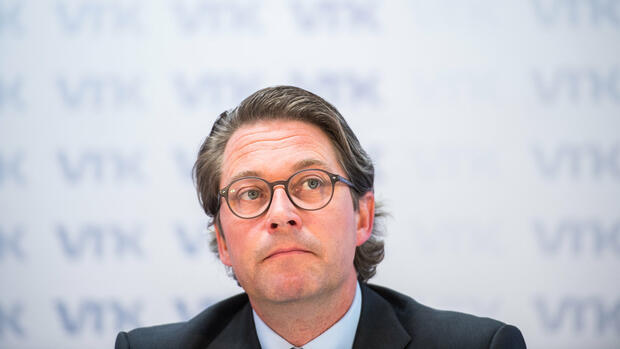The transport minister at the time was apparently certain that his toll plans would withstand an examination by the ECJ.
(Photo: dpa)
Berlin The infrastructure tax that failed in 2019, also known as the “foreigners’ toll”, is costing taxpayers dearly. The federal government will have to pay the former contractors 243 million euros for setting up and operating the car toll system. This was announced by the companies CTS Eventim and Kapsch Trafficcom AG via their joint venture, Autoticket GmbH. “The bodies of the parties have approved the settlement proposal of the arbitral tribunal,” it said in a statement. The company now expects a corresponding payment of damages and compensation from the federal government.
A representative of the Federal Ministry of Transport had previously informed the Budget Committee of the Bundestag about the comparison. The agreement had been kept top secret until then.
With the agreement, the federal government settles the dispute after a good four years. Eventim and Kapsch had originally demanded 560 million euros in damages. As it was said, the companies did not want to lead a long-term process.
A legal dispute over the truck toll between Daimler, Deutsche Telekom and the federal government is considered a negative example: Both sides had been litigating for 13 years and had each produced a good quarter of a billion euros in legal fees before the agreement was reached in 2018.
In view of this, Eventim and Kapsch were prepared to move away from their original demand. In the summer of 2022, Eventim boss Klaus-Peter Schulenberg had already explained in an interview with the Handelsblatt: “It’s not our business to conduct claims for damages. We want to realize projects and not argue.”
The history of the car toll comes to an inglorious end. Loudly demanded by the CSU in the 2013 federal election campaign, Ministers Alexander Dobrindt and later Andreas Scheuer (both CSU) tried to enforce a nationwide car toll on all trunk roads. At the end of 2018, Scheuer had contractually agreed with the companies to set up a system by October 2020 and operate it for twelve years.
Project company should earn 2.1 billion euros
The project company “Autoticket” should receive 2.1 billion euros for this. According to the Ministry of Transport, the federal government should collect a good half a billion euros net per year from the tolls – above all from foreign vehicle owners. However, Austria, with the help of the Netherlands, had brought an action against the project before the European Court of Justice – and was right in the summer of 2019.
The toll should primarily ask foreign drivers to pay.
(Photo: dpa)
As a result, Scheuer canceled all contracts within 24 hours – without talking to the company about another solution. For example, the companies would have been willing to convert the planned toll system in the direction of a climate toll. They had already offered in 2018 to first wait for the judgment of the European Court of Justice and only then to sign the contracts. A committee of inquiry set up by the Bundestag after the failure of the toll brought the corresponding findings.
But Scheuer was convinced that the court would decide in favor of the German toll plans. “He wanted the contract as soon as possible,” recalled Eventim boss Klaus-Peter Schulenberg.
After the companies derived and demanded damages from the contract, the federal government appealed to the arbitral tribunal. In March 2022, the court ruled that the claims filed by Kasch and CTS Eventim “are in substance.” Since then, both sides have been arguing about which claims are specifically justified and to what extent. This also resulted in a lawsuit before the administrative court in Berlin, where the companies requested federal documents to substantiate their claims.
A new source of income helps Finance Minister Lindner
Michael Blum, Managing Director of Autoticket, explained: “We would have preferred a modified implementation of the car toll as a climate tax for German and non-resident vehicle owners to a contentious dispute. Nevertheless, we welcome the conclusion of the proceedings through the settlement proposed by the arbitral tribunal. this leads to an “efficient” settlement of the dispute.
The compromise that has now been found should not pose any major problems for Finance Minister Christian Lindner (FDP). The Bundestag is to pass a law by October that will add an eco-component to the truck toll in the future. This ensures that from December 2023 the federal government will collect twice as much toll as before. The money for the month of December is not planned in the current budget, so around half a billion euros are available.
This allows the compensation of 243 million euros to be paid. In addition, there are the legal fees, which amounted to 21.5 million euros by the summer of last year and should be around 30 million by the end.
A second arbitration procedure relating to the car toll is still pending. It is about the contract to control toll dodgers that Kapsch had concluded. The dispute with the federal government is about an amount in the middle double-digit millions. In case of doubt, the new toll income in December should also be sufficient to settle this bill.
More: Lindner saves on the railway network – the board speaks of a “disaster”
